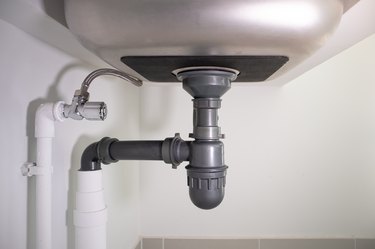
Household bleach is a common solution to many situations. It can clean and disinfect a variety of surfaces. But chlorine bleach is also potentially dangerous, especially when you mix it with other chemicals. While it's generally safe to use on PVC pipes, it might not be as effective as you think for every situation.
Basics of PVC Pipes
Video of the Day
Polyvinyl chloride, or PVC, undergoes a hardening process known as thermosetting before it begins its life as a common plumbing pipe material. This process gives the substance a hardy resistance to numerous chemicals, including bleach and even harsh drain openers. In short, it is safe to use bleach on PVC pipe, but you'll benefit in the long run if you know the basics "dos" and "don'ts" of treating PVC with various types of chemicals.
Video of the Day
Uses of Bleach
Household bleach, or sodium hypochlorite, is generally used to whiten, remove stains, and disinfect surfaces. There are numerous reasons to apply bleach specifically to your PVC pipe. You can use household bleach to clean the outside of your PVC pipes, especially if you want to disinfect them.
Commonly, household bleach serves as a drain opener for clogged pipes as well. This is a bit of a misnomer. While bleach is a great way to clean and disinfect, it does not dissolve things like hair. That means it won't be very effective at breaking up clogs in your plumbing.
However, bleach does remedy algae growth on the inside and outside of PVC pipes. You can pour bleach down the drain without worrying about the safety of your PVC pipes, but it can be dangerous if it combines with certain things trapped in the pipe, such as ammonia or vinegar. This can create poisonous gases, which can come back up the drain and affect your health. Always run lots of water down the drain if you pour bleach in it.
Considerations When Using Bleach
Though PVC piping can resist 100-percent sodium hypochlorite, it's always a good idea to use diluted bleach or a bleach solution if you decide to use it on your pipes. Dilute liquid bleach with water using a 1:2 or 1:4 ratio when cleaning the outside of your PVC pipes. You can also safely use calcium hypochlorite, or bleaching powder, on PVC pipes as well.
Other Safe Chemicals
PVC has a very strong chemical resistance, which makes it ideal for use in chemical storage tanks, drainage systems, and sewage systems. PVX has good to excellent chemical compatibility with ammonia, a common ingredient in many household cleaners. You can also use cleaners such as soda ash and borax, or sodium carbonate and sodium borate, on PVC pipe safely. Many chemicals that find themselves down the drain, such as citric acid, detergents, dyes, and glucose, have no ill effects on PVC pipes.
However, mixing chemicals can be very dangerous. If you're using bleach on your PVC pipes, don't use any other chemicals with it, especially ammonia. Combining multiple cleaners or chemicals often creates dangerous gases that can cause respiratory issues or even death.
Unsafe Chemicals for PVC
Though generally resilient, PVC's chemical composition isn't infallible. Chemicals such as acetone and phenol, used in nail polish remover and paint strippers, can have severe effects on PVC pipes. Avoid applying any chemicals from the ethyl group, including ethylene bromide, ethylene chloride, or ethylene chlorohydrin, to PVC pipes. Never pour lacquers, pine oil, sulfuric acid, or turpentine down drains connected to PVC pipes.